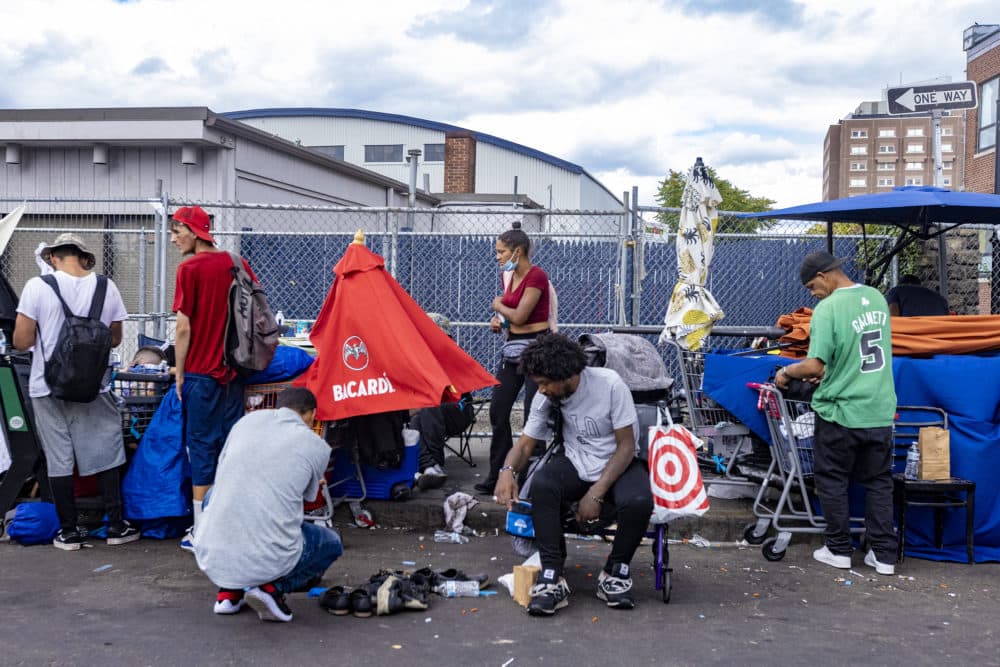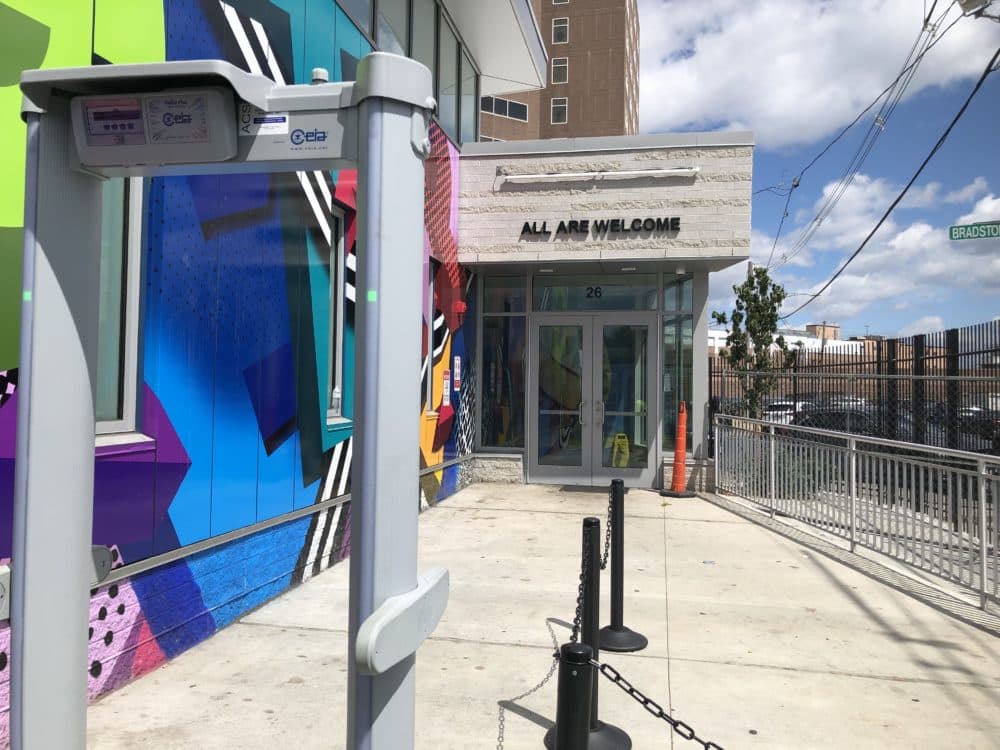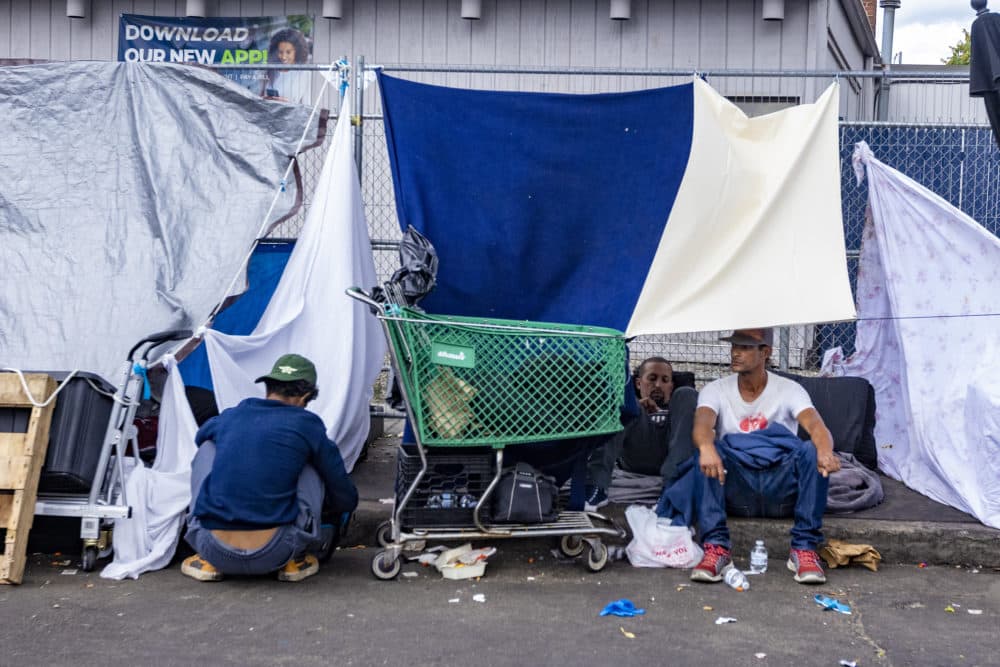Advertisement
Crowds return to 'Mass. and Cass' area in Boston, months after city dismantles encampment

Back in January, city officials cleared out a large tent encampment in Boston, near the intersection of Mass. Ave. and Melnea Cass Boulevard. But over the last few months of warmer weather, dozens of people have returned to the area.
Officials recently counted more than 160 people congregated on a two block stretch of Southampton Street, near the center of where the encampment had been. Instead of tents, most people are staying under large patio umbrellas or tarps, with their belongings in bags and shopping carts. During a visit to the area last week, most people were visibly under the influence or openly using drugs.
"It has been chaotic," said Devin Larkin, bureau director for recovery services for the Boston Public Health Commission. "August is always the most chaotic month because the number of people on the streets always swells to the highest number we see all year. I would say this year compared to last year there are a lot fewer people, but there is more violence."
Data from Boston police echo that experience. Weekly crime statistics for the neighborhood show that violent crime for the period from January through mid-August is up 6% from the same period in 2021.

The so-called Engagement Center in the neighborhood — where people could drop in during the day to use restrooms or be connected with services — is now operating in a limited capacity after a number of violent incidents in the spring. Before that, the center was open longer each day and would allow up to 120 people inside. Now, the hours are restricted and capacity is capped at 35 people; there's also a metal detector at the front door and lockers outside for people to store belongings.
Larkin said it's not clear if the center's services will expand again. She called its role in the area "a work in progress."
"The Engagement Center still provides a vital resource for people who are experiencing unsheltered homelessness," Larkin said. "People thank me and tell me every day that they're incredibly grateful for this space. We are working on assisting other providers in opening centers in other parts of the city so we don't have problems with overcrowding in the winter months."
Advertisement
Some area business leaders have expressed frustration about the crowds and the violence, according to Sue Sullivan, executive director of the Newmarket Business Association. Since the area was designated a "business improvement district," local businesses have joined together to contribute to a fund that has paid for security cameras, private security patrols and cleaning up the neighborhood.
"The open drug use and dealing has got to be addressed," Sullivan said. "At the same time no one wants to criminalize addiction."
The city has increased police patrols and said enforcement of laws against drug use is up 80% over last year.
"Police are focusing on increasing arrests of people identified as drug dealers, not necessarily the people who are dealing with a disease," said Tania Del Rio, director of Boston Mayor Michelle Wu's coordinated response team. "Some people come here because they have a substance use disorder and they have found a space where they can be cared for and they can be kept alive. We're trying to open as many doors as possible for people to get into housing and into treatment and recovery."

Del Rio said public works crews clean the streets daily and city workers clear the sidewalks on Southampton Street four times a week. Since Jan. 12, the city has assisted more than 360 people — 54 people are now in permanent housing, and 190 people are in low-threshold housing and shelter sites. Del Rio said all of the transitional housing is full and the city is looking for new housing sites.
Christina Benson, 41, is expected to get housing at the temporary one-room cottages the city set up on the campus of Lemuel Shattuck Hospital in Jamaica Plain. She is three months pregnant. Benson said she is in recovery and is no longer using crack cocaine. She is eager to have her own place to live.
"We're trying to get into the cottages," Benson said. "I think I deserve housing more than anything, I honestly do."
Both Larkin and Del Rio said workers from various city agencies and nonprofits are trying to find long-term solutions and progress is being made to provide services to those who linger on the area streets. Larkin said one challenge is that there are so many new people coming to the neighborhood for services. She said many of those she worked with in the past have found housing or are in treatment. On average, Larkin said she refers up to four people to addiction detox treatment each day.
"I think it's hard to drive by and have any understanding of the work that's going on here," Larkin said. "There is a lot of misinformation about what is happening here."
Del Rio says they are making progress. "It's not easy, it's not quick, but there are a lot of teams working to make some progress here."
This segment aired on August 24, 2022.
